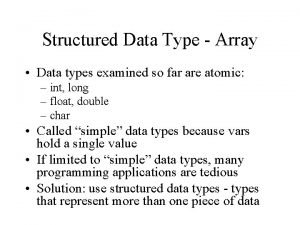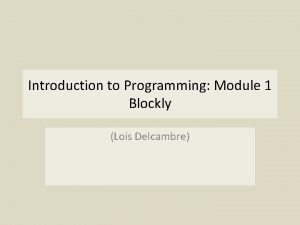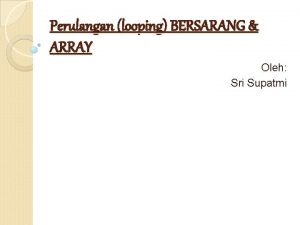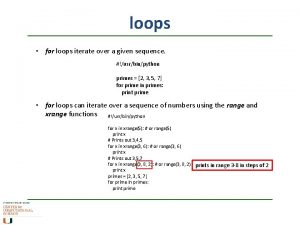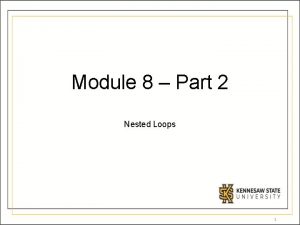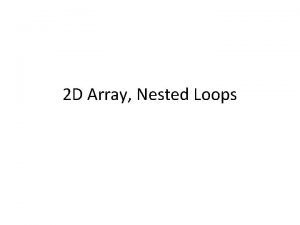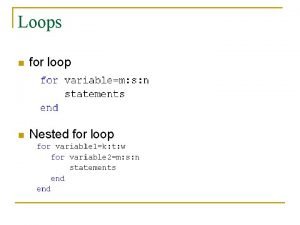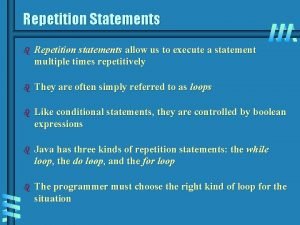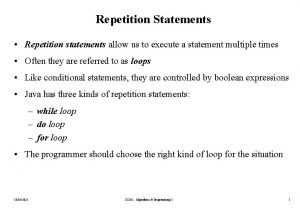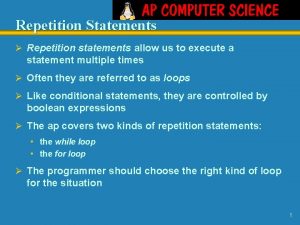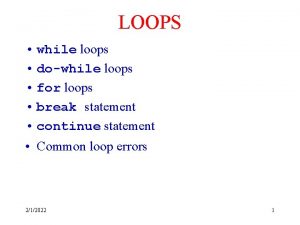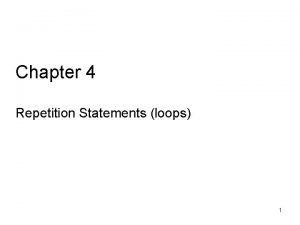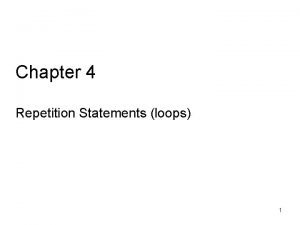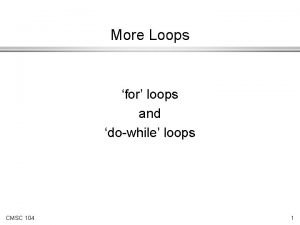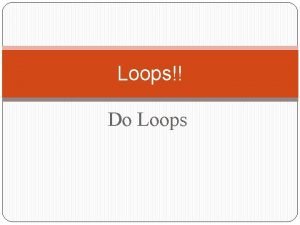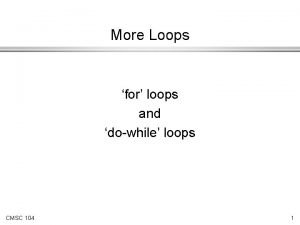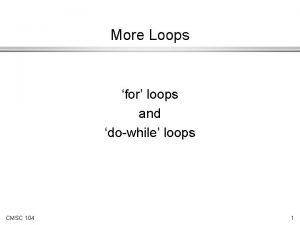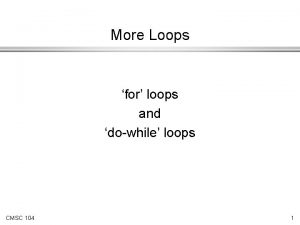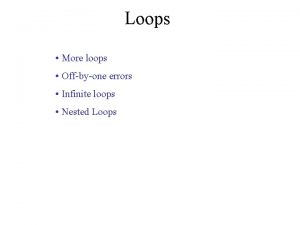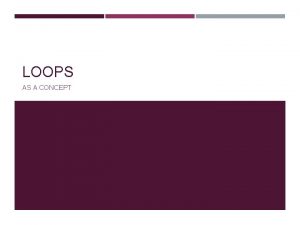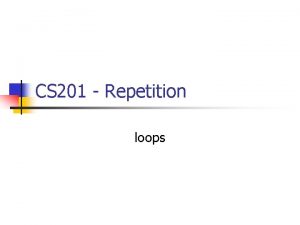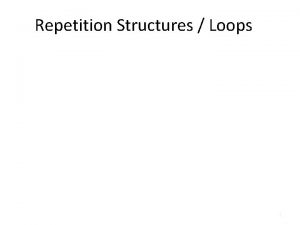Loops Repetition Statements Repetition Statements Repetition statements allow























- Slides: 23

Loops Repetition Statements

Repetition Statements • Repetition statements allow us to execute a statement multiple times • Often they are referred to as loops • Like conditional statements, they are controlled by boolean expressions

Repetition Statements • Java has three kinds of repetition statements: § the while loop § the do loop § the for loop • The programmer should choose the right kind of loop for the situation

The while Statement syntax • A while statement has the following syntax: while ( condition ){ statements; } If the condition is true, the statement is executed Then the condition is evaluated again, and if it is still true, the statement is executed again The statement is executed repeatedly until the condition becomes false 4

Logic of a while Loop condition evaluated true statement false

Example 1: • An example of a while statement: int count = 1; while (count <= 3){ System. out. println (count); count++; }

Example 2 • An example of a while statement: int count = 1; while (count < 2){ System. out. println (count); count++; }

Example 3 • An example of a while statement: int count = 7; while (count < 7){ System. out. println (count); count++; }

Example 4 • An example of a while statement: int count = 2; while (count < 3){ System. out. println (count); }

Infinite Loops • The body of a while loop eventually must make the condition false • If not, it is called an infinite loop, which will execute until the user interrupts the program • This is a common logical error • You should always double check the logic of a program to ensure that your loops will terminate Java/loops/While 1. java normally While. Ex 2. java While. Ex 1. java 10

Nested Loops • Similar to nested if statements, loops can be nested as well • That is, the body of a loop can contain another loop • For each iteration of the outer loop, the inner loop iterates completely

Nested Loops • How many times will the string "Here" be printed? count 1 = 1; while (count 1 <= 10){ count 2 = 1; while (count 2 <= 20){ System. out. println ("Here"); count 2++; } count 1++; } 10 * 20 = 200

The do Statement • A do statement has the following syntax: do{ statement; } while ( condition ) The statement is executed once initially, and then the condition is evaluated The statement is executed repeatedly until the condition becomes false

Logic of a do Loop statement true condition evaluated false

The do Statement • An example of a do loop: int count = 0; do{ count++; System. out. println (count); } while (count < 3);

The do Statement • An example of a do loop: int count = 100; do{ count++; System. out. println (count); } while (count < 3); The body of a do loop executes at least once

Comparing while and do The while Loop The do Loop statement condition evaluated true statement true false condition evaluated false

The for Statement • A for statement has the following syntax: The initialization is executed once before the loop begins The statement is executed until the condition becomes false for ( initialization ; condition ; update ){ statements; } The increment portion is executed at the end of each iteration

Logic of a for loop initialization condition evaluated true statements update false

The for Statement • A for loop is functionally equivalent to the following while loop structure: initialization; while ( condition ){ statement; update; }

The for Statement • An example of a for loop: for (int count=1; count <= 3; count++){ System. out. println (count); } The initialization section can be used to declare a variable Like a while loop, the condition of a for loop is tested prior to executing the loop body Therefore, the body of a for loop will execute zero or more times

The for Statement • Each expression in the header of a for loop is optional • If the initialization is left out, no initialization is performed • If the condition is left out, it is always considered to be true, and therefore creates an infinite loop • If the increment is left out, no increment operation is performed Java/Loops. For 1. java For 2. java, For 3. java, For 4. java,

Questions? ? ? Java/Loops/For. While. java For. Inside. While. java
 Structured text array
Structured text array Adobe audition loops
Adobe audition loops Oracle plan de ejecucion
Oracle plan de ejecucion Loops o repeticiones
Loops o repeticiones Lesson 13 bee nested loops
Lesson 13 bee nested loops Nested for loop alternative
Nested for loop alternative Loops in sequence diagram
Loops in sequence diagram Nested loops storytelling
Nested loops storytelling What is the output of the following nested loop
What is the output of the following nested loop Cakewalk loop construction
Cakewalk loop construction What is nested loop
What is nested loop Dynamic vs adynamic intestinal obstruction
Dynamic vs adynamic intestinal obstruction Sun means
Sun means Non touching loop example
Non touching loop example Lesson 7 sticker art with loops
Lesson 7 sticker art with loops Nested loops python
Nested loops python Broadcasts packets, but creates loops in the systems.
Broadcasts packets, but creates loops in the systems. Be8255 ppt
Be8255 ppt Perulangan python
Perulangan python Gas-filled bowel loops in abdomen meaning
Gas-filled bowel loops in abdomen meaning Pascal loop example
Pascal loop example Seninel
Seninel Myxodoema
Myxodoema Loops
Loops
